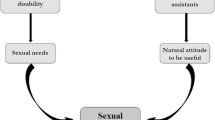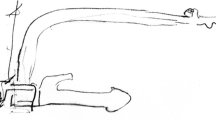Abstract
Sexual assistance services that people with disabilities use for help with sexual activity must be specialized and adapted to the users’ different conditions. Some aspects of sexual assistance have been mentioned in the literature, but the subject is still relatively unexplored, particularly regarding adapted services for people with disabilities. The objective was to create a toolbox with items that might be required in encounters with individuals with disabilities and to think of innovative ideas to improve sexual assistants’ work. This multi-method qualitative study involved two meetings: one workshop and one co-design session. The sample included six future sexual assistants studying at the Italian Institute of Sexology in Rome. The workshop presented two different scenarios so the students could think of what is needed to improve their work. At the end of the workshop, a list of items was developed. The co-design session explored possible design solutions to improve and facilitate their work as sexual assistants. The idea that interested everyone due to its practicality, usability and feasibility was an inflatable sofa/mattress that includes internal divisions so different sections of the mattress can be inflated and/or deflated. The development of projects such as this one provides different perspectives on what still needs to be done within the sexual assistance domain.




Similar content being viewed by others
References
Chatton, D.: Assistance sexuelle, assistance au développement sexuel? Reliance 3(29), 62–65 (2008). https://doi.org/10.3917/reli.029.0062
Diserens, C.A.: La formation en assistance sexuelle: toute innovation implique des risques! Reliance 3(29), 46–52 (2008). https://doi.org/10.3917/reli.029.0046
Rosenbaum, T., Aloni, R., Heruti, R.: Surrogate partner therapy: ethical considerations in sexual medicine. J. Sex. Med. 2(11), 321–329 (2013). https://doi.org/10.1111/jsm.12402
Diserens, C.A.: Les institutions au risque du désir. Situations de handicap et sexualités: quels accompagnements? Nouv. Rev. Adapt. Scolar. 3(47), 123–134 (2009). https://doi.org/10.3917/nras.047.0123
Brasseur, P., Dentuncq, P.: L’assistance sexuelle: qu’est-ce à dire? Quels enjeux? Vie Soc. Traite. 3(123), 51–56 (2014). https://doi.org/10.3917/vst.123.0051
Nuss, M.: Enjeux politiques et juridiques de l’accompagnement sexuel. Reliance 3(29), 26–32 (2008). https://doi.org/10.3917/reli.029.0026
Soulier, B.: Accompagnement sexuel ou accompagnement sensuel? Reliance 3(29), 107–112 (2008). https://doi.org/10.3917/reli.029.0107
Aregger, J.: L’assistance sexuelle: Une réelle amélioration de la qualité de vie des personnes vivant avec un handicap, âgées ou souffrant de troubles sexuels, grâce à une prestation de travail du sexe—est-ce socialement acceptable et intégrable? (Thesis, University of Geneva, Geneva) (2016). https://www.unige.ch/formcont/files/9715/1326/9622/CAS_sexologieclinique_memoire_assistance_sexuelle_Aregger.pdf. Accessed July 2018
Kessler, S.: Mais qui sont-ils? La sélection des candidats qui se destinent à l’assistance sexuelle. Reliance 3(29), 53–57 (2008). https://doi.org/10.3917/reli.029.0053
Girard, J.: Handicapés, pas asexués. (Thesis, Institut universitaire de technologie, Paris) (2013). www.iut.parisdescartes.fr/content/download/…/1/…/mémoire_jennifer_girard_AS2.pdf. Accessed July 2018
Comité consultatif de bioéthique de Belgique: Avis relatif à l’assistance sexuelle aux personnes handicapées. (Publication no 74) (2017). https://www.health.belgium.be/sites/default/files/uploads/fields/fpshealth_theme_file/avis_74_ass_sexuelle_aux_ph.pdf. Accessed July 2018
Geymonat, G.G., Macioti, P.G.: Ambivalent professionalisation and autonomy in workers’ collective projects: the cases of sex worker peer educators in Germany and sexual assistants in Switzerland. Soc. Res. Online 21(4), 1–14 (2016). https://doi.org/10.5153/sro.4146
Schaller, J.: Sexualité et handicap: les assistant(e)s sexuel(le)s pour une humanité de la rencontre. Sujet Cité 1(1), 130–143 (2010)
Naphtali, K., MacHattie, E., Elliot, S.L.: Pleasure able: sexual device manual for persons with disabilities (2009). http://www.dhrn.ca/files/sexualhealthmanual_lowres_2010_0208.pdf. Accessed July 2018
Quattrini, F.: Assistenza sessuale: il progetto LoveGiver per la formazione degli operatori. In: Ulivieri, M. (ed.) LoveAbility, pp. 61–91. Erickson, Trento (2014)
Morales, E., Gauthier, V., Edwards, G., Courtois, F., Lamontagne, A., Guérette, A.: Co-designing sex toys for adults with motor disabilities. Sex. Disabil. 36(1), 1–22 (2018). https://doi.org/10.1007/s11195-017-9506-8
Morales, E., Gauthier, V., Edwards, G., Courtois, F.: Women with disabilities’ perceptions of sexuality, sexual abuse and masturbation. Sex. Disabil. 34, 303–314 (2016). https://doi.org/10.1007/s11195-016-9440-1
Morales, E., Gauthier, V., Edwards, G., Courtois, F.: Masturbation practices of men and women with upper limb motor disabilities. Sex. Disabil. 34, 417–431 (2016). https://doi.org/10.1007/s11195-016-9445-9
Sanders, E.B.N., Stappers, P.J.: Co-creation and the new landscapes of design. CoDesign 4(1), 5–18 (2008)
Francis, P., Balbo, S., Firth, L.: Towards co-design with users who have autism spectrum disorders. Univ. Access Inf. Soc. 8(3), 123–135 (2009)
Frauenberger, C., Good, J., Keay-Bright, W.: Designing technology for children with special needs: bridging perspectives through participatory design. CoDesign 7(1), 1–28 (2011)
Miles, M.B., Huberman, A.M.: Analyse des données qualitatives, 2nd edn. De Boeck Supérieur, Brussels (2003)
Mouget, A.: Sexualité récréative des hommes handicapés moteurs. Dialogue 212(2), 65–78 (2016). https://doi.org/10.3917/dia.212.0065
Earle, S.: Disability, facilitated sex and the role of the nurse. J. Adv. Nurs. 36(3), 433–440 (2001)
Mona, L.R.: Sexual options for people with disabilities: using personal assistance services for sexual expression. Women Therapy 26(3/4), 211–221 (2003)
Bahner, J.: The power of discretion and the discretion of power: personal assistants and sexual facilitation in disability services. Vulnerable Groups Incl. (2013). https://doi.org/10.3402/vgi.v4i0.20673
Bahner, J.: Legal rights or simply wishes? The struggle for sexual recognition of people with physical disabilities using personal assistance in Sweden. Sex. Disabil. 30(3), 337–356 (2012). https://doi.org/10.1007/s11195-012-9268-2
Vaginay, D.: Quelle éthique pour un accompagnement sexuel? Reliance 3(29), 66–73 (2008). https://doi.org/10.3917/reli.029.0066
Fritsch, K., Heynen, R., Ross, A.N., van der Meulen, E.: Disability and sex work: developing affinities through decriminalization. Disabil. Soc. 31(1), 84–99 (2016). https://doi.org/10.1080/09687599.2016.1139488
Author information
Authors and Affiliations
Corresponding author
Additional information
Publisher's Note
Springer Nature remains neutral with regard to jurisdictional claims in published maps and institutional affiliations.
Rights and permissions
About this article
Cite this article
Morales, E., Quattrini, F., Auger, C. et al. What Sexual Assistants Want and Need: Creating a Toolkit and New Solutions to Help Them Better Perform Their Work with Individuals with Disabilities. Sex Disabil 38, 19–29 (2020). https://doi.org/10.1007/s11195-019-09614-2
Published:
Issue Date:
DOI: https://doi.org/10.1007/s11195-019-09614-2




